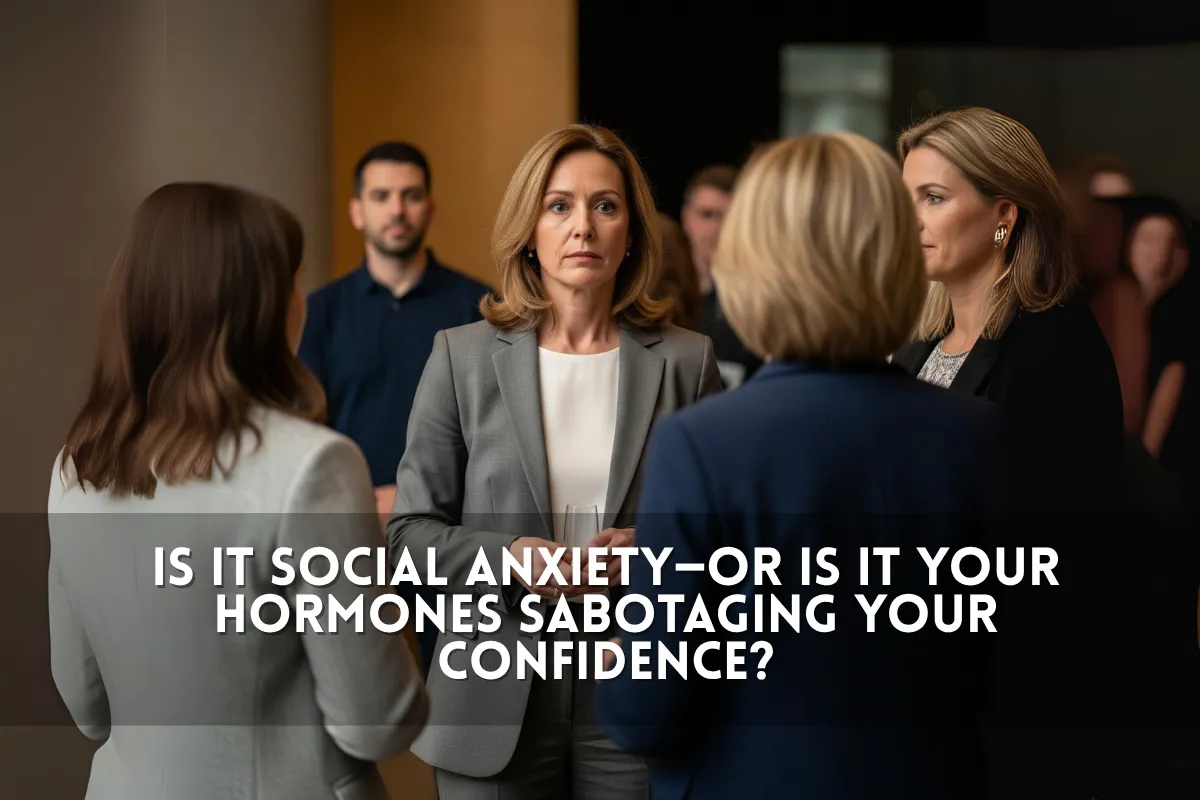
Is It Social Anxiety—Or Is It Your Hormones Sabotaging Your Confidence?
Is It Social Anxiety—Or Is It Your Hormones Sabotaging Your Confidence?
Do you dread walking into social situations—even ones that should be low-stakes? Do your heart race, hands sweat, or stomach drop when you think about speaking up in a meeting, attending a party, or making small talk? If you’re over 40 and social situations suddenly feel like landmines, let’s talk about what’s really going on.
Yes, social anxiety disorder (SAD) is real. But for many women, especially in perimenopause or menopause, what looks like anxiety isn’t just about personality or past trauma. It’s about brain chemistry being hijacked by hormone shifts.
What Is Social Anxiety—Really?
Social anxiety is more than shyness. It’s an intense, persistent fear of being judged, watched, or humiliated in social situations. It can show up as:
Racing heart, sweating, or blushing
Shaking hands or voice
Stomach upset, nausea, or needing to escape
Avoiding conversations or gatherings
Worrying for weeks before an event
Replaying every interaction afterward, obsessively
For some, it starts young. But for others? It shows up later in life, often triggered by hormonal upheaval that throws the brain’s emotional regulation system out of balance.
The Hormone–Anxiety Connection You Need to Know
Here’s what we’re not told: estrogen and progesterone are essential to emotional regulation. When they go haywire, so does your sense of safety, confidence, and calm.
Estrogen affects serotonin and dopamine—your mood, motivation, and confidence neurotransmitters. When estrogen drops, serotonin tanks. That “I’m fine” inner voice? Gone.
Progesterone boosts GABA, your brain’s calming chemical. But when progesterone crashes (especially in perimenopause), so does your ability to self-soothe. Cue: social panic, inner spirals, and sleepless nights rehashing conversations.
Cortisol, your stress hormone, loves to overact when estrogen and progesterone are low. That’s why minor social stress suddenly feels life-threatening.
Bottom line: if you’re in your 40s or 50s and social anxiety is ramping up, it’s not just your mind—it’s your hormones.
What Makes It Worse?
Social anxiety tends to flare when:
You’re sleep-deprived, which often goes hand-in-hand with hormone imbalance
You’re drinking more caffeine, wine, or skipping meals
You’re dealing with body changes that make you self-conscious (hello, belly bloat, brain fog, or thinning hair)
You’re under extra pressure—emotionally, socially, professionally—and no longer have the hormonal “buffer” you once did
And let’s be real: the expectations placed on women to hold it all together while feeling like they’re falling apart? That doesn’t help either.
How to Break the Cycle
You don’t have to hide or “push through.” You can treat the real root cause.
Here’s the functional medicine approach I recommend:
✅ Test your hormones—estrogen, progesterone, cortisol, thyroid
✅ Balance with BHRT (bioidentical hormone replacement therapy) to stabilize mood-regulating pathways
✅ Use CBT (cognitive behavioral therapy) or exposure therapy to rewire anxiety patterns
✅ Support your nervous system with magnesium, GABA, adaptogens, and gentle movement
✅ Track your patterns—see if your anxiety is cyclical, worse premenstrually, or tied to stress and sleep
✅ Cut down caffeine and alcohol, especially in the second half of your cycle
✅ Explore short-term use of SSRIs or anti-anxiety meds if needed while rebalancing hormones
You Deserve to Feel Comfortable in Your Own Skin Again
Social anxiety doesn’t have to rule your life. If you’re suddenly anxious, avoidant, or constantly self-editing—especially if that’s new for you—it’s time to stop blaming your personality and start investigating your biochemistry.
👉 Book your consult now at getmerva.com
👉 Let’s find out what your hormones are doing and build a plan that helps you show up in the world with confidence again.


